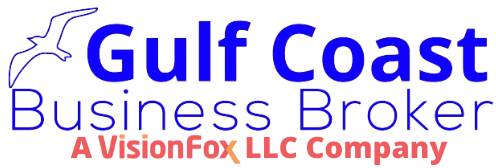BUYING
FAQ
BUYING A GULF COAST BUSINESS

If you are considering buying a Gulf Coast Business let’s talk. The Gulf Coast offers a great place to live, grow, work and play. Our founder Mike Steward has been doing just that most of his life. Buying a business can be a complicated process, from finding the right one, getting the right business information to working out all the details required for a smooth transfer of ownership.
Some say that there is no such thing as the “perfect” business. We believe if you find the right Gulf Coast business that fits your needs, talents, and skills, the perfect business has been found Gulf Coast Business Broker is here to help you navigate the process and be your outside resource during the journey from search, selection, acquisition, coaching and consulting.
Below we have added some information as you consider whether buying a business is right for you. We congratulate you on taking steps towards finding a business that can help you enjoy the Gulf Coast lifestyle.
FOR BUSINESS BUYERS
Buying a business can be full of apprehension and even fear for some. If this is your first business acquisition on the Gulf Coast, the process might begin to feel confusing and even make some buyers stop the process prematurely. Most buyers often end up buying a business different than what they originally started looking for. These buyers explore the marketplace, become open to new ideas, and subsequently find a business more to their liking.
Owning your own business is more than owning a job, or it should be. In most cases, it can and should be a very big lifestyle change. Depending on your background and skills you will either begin to work in the business or work on the business. We tend to hope that you will find your way and work on the business and hire wisely to help you grow your business.
FREQUENTLY ASKED QUESTIONS BUYERS HAVE FOR SELLERS
1. How long the business has been in business.
Often a business with a long track record means there is a large enough demand for their product or service that it can produce enough revenue to continue to operate profitably. The business will also have an established reputation in the area. We often find that a business that has been established for 5 years or more can be a more valuable asset if managed properly.
2. How long the present owner has owned the business.
The longer the present owner has been in business, the more likely he or she has been successful. People don’t stay in business if they are not making money. If the business has had multiple owners there sometimes can be a void in a strong positive culture.
3. Why the present owner is selling.
It is not uncommon for the founder to get burnt out after making it through the years of developing a larger profitable business. Often the founder may have a 10 - 20 year plan of growing the business with the intent of selling and using the funds for retirement. There are other times when a business might outgrow its current owner and the demands and knowledge needed are higher than what the current owner is able to contribute. It is always good to gain an understanding of why the business owner may want to sell. You can sometimes identify if you would have the same voids in operating the business.
4. Why books and records are important.
Business financial records are truly the only indication of how healthy the business has been over the years. Tax records may not always show the business in the best light; no one likes to pay more taxes than they have to, and business owners are no different. Generally, tax returns may have deductible items rolled in that are different than new ownership may desire. You need to be able to look at the expenses and discover which ones are non-cash items, such as depreciation and business use of homes and vehicles. Gulf Coast Business Broker is capable of helping you review financials and prepare you to ask the right questions along the way.
Businesses Buyers should use the Seller's financial records as a look back in history. This does not mean that the same results can always be duplicated or repeated. All of your profits are future. Business financials can help you see what the likelihood of future results may be. It is equally as important to verify that the Seller has accurate bookkeeping. Unfourtanlaty, not all business owners understand the importance of great record-keeping and clean clear financial records when they are selling a company here along the Gulf Coast. May started their coastal business with great intentions of a lifestyle, but without discipline and good bookkeeping habits, it can become difficult to show the value of your business.
5. Are the seller's financials accurate?
It is illegal for a business owner to file inaccurate tax returns. When evaluating a business for sale you should only consider the income and expenses that have been reported on the seller's tax returns. We recognize that in a business that takes in a lot of cash there is a possibility that the seller is not reporting all of the income “for tax purposes”. It can be very difficult to prove the amount of unreported cash a business produces. When buying a business you are paying for the likelihood that past profits can be duplicated or increased in the future. If you are unable to see proof of all past profits the business has generated then the value would be considered lower.
THE BOTTOM LINE
Buying a business here along the Gulf Coast can be an exciting yet risky process. There are no guarantees. At some point, after all of your investigation is completed, you will still have to make that “leap of faith” that is necessary to proceed with the purchase of the business. You will have to work hard, perhaps even “tighten your belt” a little, and perform many different jobs to be successful in your own business. But, if running your own show, making your own decisions, not having to worry about job security (remember, no one can fire you from your own business), and just being on your own are important – then owning a business is for you. After taking this leap of faith, almost all business owners will tell you that they would never go back to being an employee.
FOR BUSINESS BUYERS
The first step to buying your own business is to make sure it is the right move for you and your family. Owning your own business is still very much “the great American dream,” but it’s not for everybody. Here are some questions that you should ask yourself before taking the next step.
Are you just looking or are you serious about buying a business?
Many people are interested in buying their own business but are not willing to make the commitment necessary to move forward. The process of buying a business takes action. It requires you to be able to keep moving forward in a process and even sometimes feel slightly uncomfortable. Many continue to look just like those who continue to look at new and expensive automobiles, but will never spend the time and money necessary to buy. There are times when you find that the longer you look, the less likely you are to buy.
What is your time frame to find a business and what to do now?
If you’re thinking of buying a business in two years, it’s good to start your education. BizBuySell and Vision Fox Business Advisors are a good place to start. Keep in mind that it really doesn’t make sense to look at business now if you are two years out from buying, the businesses you find now will have been sold by the time you are ready to buy. It’s important, however, to arm yourself with all of the information and education available before you begin the search. We suggest spending those hours on educating yourself vs simply looking at a Gulf Coast business online that may be sold when you are prepared.
What is your primary motivation for buying a business?
If you are not motivated to buy a business, you won’t. It’s simply too much risk and comes with too much responsibility for an unmotivated person. You must go into business for yourself for the right reasons. If you’re tired of the corporate world, just have a “job-job,” or perhaps even a dead-end job, then business ownership may be right for you. Certainly, if you’re unemployed or being transferred to a place where you don’t want to go – buying your own business can be a viable solution. I find for most business buyers it’s about controlling their future and creating wealth.
Are you willing to invest a large amount of your liquid assets into a business?
Buying your own business often requires a serious financial investment. When you buy a business you are often writing three checks. One for the acquisition cost, a second for inventory, and a third for the upcoming payroll and other operating expenses. If you’re the type who does not want risk, you might want to rethink owning your own business. It is not for the faint-hearted.
Are you confident enough to make your own decisions and be in control?
Operating a small business requires continual decision-making. You’re the boss, and you are in control. All of the decisions are yours – right or wrong. And, many will make a lot of wrong ones. The question is, can you recover and keep going forward?
If you move slowly due to concerns of making poor decisions or they keep you awake at night, owning your own business may not be for you.
Is your family supportive of you becoming a Gulf Coast business owner?
If your family, especially a spouse, is not behind you 100 percent, then you should think twice about business ownership. Better yet you should help him or she become 100 percent supportive. It’s very important that you have the support of your spouse. He or she has to understand that running a business can be time-consuming. On the plus side, however, business owners often have more flexibility so you can attend the afternoon little league game or other activities that may have been difficult in the past..
Are you allowing yourself to look at different opportunities, or are you looking for a specific type of business?
It’s best if you are open-minded, especially if you are a first-time buyer. Limiting your choices may keep you from ever becoming a business owner. You should be looking for a business that will provide the income you need (or ability to do so), that you can afford, that has numbers that work, and, most importantly, that you can see yourself being the CEO of..
Are your expectations reasonable?
Do you think that you can buy a business with great cash flow for $1,000? It’s important that you have realistic expectations about what your money will buy. Many sellers are willing to assist in financing the sale of their business, but remember, they’re typically not going to give it away. Keep in mind that many business owners have spent years building their business, and this may be the biggest financial asset they have. They’re going to have a reasonable expectation of the value they have created and expect when they sell their business.
Can you make the “leap of faith” necessary to buy a business?
It’s not uncommon for prospective business owners to do their research, do everything necessary to begin the purchase process, and then back out of the transaction right before it’s time to make an offer. They just don’t have the courage to go forward. There is nothing wrong with that; not everyone should buy and own their own business. However, if you don’t think you can part with your money and take over operating the business on your own, you may want to take a second look at business ownership. We have had this conversation with many first-time business owners. We encourage you to speak with us before you just stop the process. Buying a business can be mentally challenging if you do not get in the right headspace. So many miss out on making their dreams come true though because they don’t have the right person to help them, Mike Steward and our team at Gulf Coast Business Broker are here to help you move forward - at the pace that’s right for you.
Do you need a guarantee?
If you are looking for a guarantee then business ownership is not for you. You can and should look at all of the financials, tax returns, and all of the books and records. Remember, however, that they all represent the history of the business. A new owner makes changes, no matter how small. Their management style is different, and times change. You have to look at the business with the attitude of how you can improve things. The financial history of the business is certainly important, but it does not guarantee the future of the business – you and your efforts do.
WHAT SHOULD YOU LOOK FOR WHEN CONSIDERING A BUSINESS TO PURCHASE?
Unfortunately, we see a lot of prospective buyers who stay focused on the asking price and how much money they can make. You need to know how much cash the seller requires as a down payment. No matter how good the numbers are, there is no point in looking at a business if the seller wants three times as much cash as you are willing to invest. Remember, the actual amount of money a business earns is usually much more than just the bottom line. A smart approach is to get more information on the business, and even make a visit, before ruling it out or getting too involved in the numbers. It’s all part of the learning process.
One of the most common questions asked by those who have never purchased a business (which is about 90 percent of those looking to buy a business) is how do you actually purchase a business. There is no right or wrong way to buy a business.
However, it is important that you get answers to all of your questions and that you have all the information necessary to make an informed decision. Here are the common steps to buying a business:
Get the Preliminary Facts
Get preliminary information on price, terms, income, cash flow, and general location. There is no point in continuing the buying process if the amount of cash necessary to buy the business is more than you are willing to invest. At this point, don’t worry about the full price. It’s important, but the key factor is the amount of cash that is necessary to buy the business. Often some of the business purchase price is financed by the seller. This is why the amount you are willing to invest is a key issue.
Also, the business has to be able to meet your basic financial needs. You always expect a business to improve under your ownership, but you have to be able to meet your living expenses as well as meet the debt service of the business. It is also important to remember that almost all purchase prices and down payments are negotiable. In fact, businesses generally sell for about 15 percent to 25 percent less than the original asking price.
Visit the Business Virtually or in Person
Begin to look at the business online and on Google Earth. Once our Broker has approves a visit it is time to visit the business and see if you like the location and the looks of the business itself – both inside and outside. This is a visual inspection.
Pretend you are a customer. This IS NOT a time to talk to the owner or the employees about the specifics of the business. Remember you have signed a confidentiality agreement and the seller doe not want his team or other customers to know the business is for sale. If the business is the type that does not lend itself to a visit, make an appointment with your Business Broker to inspect the business. There is no point in going any further if you don’t like the physical location of the business or the appearance of it.
Get Questions Answered
If you like the business so far, it’s time to get your questions answered. For example: What is the rent? How long is the lease? What have been the sales for the past few years? Can the seller support the figures you have been told? Now is not the time to have the seller’s books and records completely checked. There will be plenty of time to do that and review other important issues during the due diligence phase. This is the time to get those questions answered that have a bearing on whether you may want to own and operate this particular business. It is also the time to visit with the seller to get your questions answered about the business itself. At Gulf Coast Business Broker and Vision Fox Business Advisors, we typically offer a group conference call or video call where we can meet with all parties involved and talk openly and comfortably.
Make an Offer
If you now have your basic questions answered and you want to proceed with purchasing this business, it is time to make an offer, subject, of course, to verification of all the information you have received. The main purpose of making an offer is to see if the seller will accept your terms, price, and structure of the sale itself. Remember, you will have the offer subject to your verification of the important information. It doesn’t make sense to employ outside advisors and go through the time and expense of due diligence unless you can come to financial terms with the seller. We generally call this a Lett of Intent. We aid the buyer in writing up what their intent is as regards to purchase price and other terms. Once both parties have signed off acceptance we would then move into the due diligence stage.
Due Diligence
At this point, you have arrived at a meeting of minds with the seller, and you are ready to begin removing the contingencies, performing what is commonly called due diligence.
*Insider Tip
Unless you are completely familiar with the type of business purchased, it is beneficial to include as part of the agreement that the seller will stay with you (30 days is fair, with perhaps another 30 to 60 days of telephone consultation) a sufficient length of time to teach you the business – at no charge. If you want the seller to stay longer, it may be best to offer to pay him or her a consulting fee of some type.
Do you have addiatioanl questions?
Be sure to visit Buyer FAQ for answers to the following questions:
- Why should I buy a business in the Gulf Coast rather than start one?
- What is the real reason people go into business for themselves?
- How are businesses priced in Gulf Coast areas?
- What should I look for when buying a Gulf Coast Business?
- What does it take to be successful in coastal communitites?
- What happens when I find a business I want to buy?
- Why should I go to a Gulf Coast business broker?
- Do I need an attorney located in the Gulf Coast?
FAQ
Buyer FAQ
It is never too early to start thinking about what tax structure you should use when it comes time to sell your business. A simple, but undeniable, rule of life is that taxes matter and they can’t be overlooked. Author Tim Fries at The Tokenist has written an excellent and quite detailed overview article on what tax issues business owners need to consider before selling their business. His article, “What Tax Structure Should You Use When Selling Your Business?” explores many aspects of a topic that many business owners fail to invest enough time in, namely taxes.
As Fries astutely points out, the taxes involving the sale of a business can be complex and are usually unknown to those selling a business for the first time. Your tax structure can influence how much money you receive at the closing of your deal, so it’s a very good idea to pay attention to all aspects of taxation and your business. It is key to remember, “When you are selling your business – as far as taxes are concerned – you’re ultimately selling a collection of assets.”
Fries points out that taxes and selling a business are no small matter. It is possible that up to 50% of the sale of a business can go to taxes. Don’t worry if you are learning this for the first time and feel more than a little shocked. However, this fact does a good job of illuminating the importance of setting up the right tax structure for your business. While you might not be able to get around taxes altogether by investing the time and effort to set up the right structure for your business, you can keep from paying more taxes than is necessary.
There are a lot of variables that go into how much you will ultimately have to pay in taxes. Let’s take a look at some of the key questions Fries raises in his article.
- Is your sale considered ordinary income or is the sale considered capital gains?
- Are you operating as an LLC, a sole proprietorship, a partnership or are you operating as a corporation?
- What portion of the sale price goes to tangible assets as compared to intangible assets?
- Is there a difference between your tax basis and the proceeds from your sale?
- What does your depreciation look like?
- Don’t expect that the buyer will instantly agree to your terms.
- Realize that the decisions you make during negotiations with a buyer will have tax implications.
- Is an installment sale right for your business?
- With C corporations, sellers usually want a stock sale whereas buyers generally prefer an asset sale.
- Cashing out immediately, where you receive all your funds at once, will increase your tax liability.
- Have you considered switching to an S corporation?
- Have you consulted with experts to decide which tax structure is best for you?
- Have you consulted with a business broker?
Selling a business is obviously complicated. Finding a seasoned business broker can help you demystify many aspects of buying and selling a business. Ultimately, having the best deal structure and finding the right buyer can be a labyrinthian process. Having the very best professional help in your corner is simply a must.
The old saying, “an ounce of prevention is worth a pound of cure,” most definitely applies to any business owner that believes he or she will someday want to sell his or her business. The bottom line is that every business owner has to transition out of ownership at some point. In a recent Inc. article, “Four Mistakes That Could Lower Your Business’s Value and Weaken Its Salability,” author Bob House explores 4 mistakes that could spell trouble for business owners looking to sell.
No doubt House explores some excellent points in his article, such as that you should always have what he calls, “a selling mindset.” The reason this mindset is potentially invaluable for a business owner is that when operating in this way, sellers are essentially forced to stay on their toes.
Or as House writes, “a selling mindset encourages continual innovation, growth, and investment, helping your business stay ahead of the competition and at the top of its potential.” Having a “selling mindset” means that business owners have no choice but to perform periodic reality checks and access the strengths and weaknesses of their businesses.
Mistake #1 Poor Record Keeping
For House, poor record-keeping tops the list of big mistakes that business owners need to address. As House points out, both potential buyers and brokers will want to examine your books for the last few years. The odds are excellent that before anyone buys your business, they will look very closely at every aspect of your financials, ranging from your sales history to your operating costs.
Mistake #2 Failure to Innovate
The next potential mistake that business owners need to avoid is a failure to innovate. House notes that a lack of tech-savviness could make your business less attractive to prospective buyers. The simple fact is that virtually every business is now impacted in some way by its online presence, whether it is the quality of that presence or lack of it altogether.
For House, a failure to maintain an active online presence could be associated with a failure to innovate. Even if your company is innovative, if you do not maintain a coherent and robust online presence, this could portray your company in a negative light.
Mistake #3 Unstable Workforce
House also feels that having an unstable workforce could spell trouble for your business’s value and negatively impact its salability. Most prospective buyers will not be very eager to buy a business that they know has a lot of employee turnover. In general, new business owners crave stability. Attracting and keeping great employees could make all the difference when it comes time to sell your business.
Mistake #4 Delayed Investments
The final factor that House notes as a potential issue for those looking to sell their business is delaying investments and improvements. House states that it is important for owners to continue to invest even if they know they are going to sell. Investing in your business can help it expand, grow and showcase its potential future growth.
Another excellent way to prevent making mistakes that could interfere with your ability to sell your business is to begin working with a business broker. A top-notch broker knows what mistakes you should avoid. This experience will not only save you countless headaches but also help you preserve the value of your business.
M&A purchasing agreements can have a lot of moving parts. A recent article from Meghan Daniels entitled, “The Makings of the M&A Purchase Agreement” serves to outline a range of facts including that every M&A deal is different. The article, which serves as a general overview, raises a range of good points.
Components of the Deal
It should come as no surprise that M&A purchase agreements have various components. Everything from definitions and executive provisions to representatives, warranties and schedules, indemnifications and interim and post-closing covenants are all covered in these purchase agreements. Other key factors included in M&A purchase agreements are closing conditions and break-up fees.
Advice for Sellers
In her article, Daniels includes a range of tips for sellers. She correctly points out that negotiating a purchase agreement (as well as the different stages involved in finalizing that agreement) can be both time consuming and stressful.
As any good business broker will tell you, business owners have to be careful not to let their businesses suffer while they are going through the complex process of selling. Selling a business is hard work, and this fact underscores the importance of working with a proven broker.
Likewise, Daniels observes that any serious buyer is likely to look quite closely at your business’s financials, which is yet another reason to work with key professionals during the process. Additionally, you don’t want to wait until the last moment to get your “financial house in order.”
You can be completely certain that prospective buyers will want to examine your finances closely before making an offer. The sooner you begin working on getting your finances together, the better off you’ll be.
Use Trusted Pros
Another key point Daniels makes is that there will be tension, as every party is looking to protect their own best interests. Having an experienced negotiator in your corner is a must. Make sure your negotiator has bought and sold businesses in the past, and he or she will understand what pitfalls and potential problems may be lurking on the horizon. Daniel’s view is that the sale price isn’t the only variable of importance. Factors such as the terms of the deal must be taken into consideration.
The bottom line is that there are many reasons to work with a business broker. A business broker understands the diverse complexities of an M&A purchase agreement. They also have experience helping business owners organize their financial information and can prove invaluable during negotiations. For most business owners, selling their business is the single most important business decision they will ever make. Find someone who understands the process and can act as a guide through the process.
Every year countless great deals, deals that would have otherwise gone through, are undone due to a failure to properly utilize and follow confidentiality agreements. A failure to adhere to this essential contract can lead to a myriad of problems. These issues range from employees discovering that a business is going to be sold and quitting to key customers learning of the potential sale and taking their business elsewhere. Needless to say, issues such as these can stand in the way of a sale successfully going through. Maintaining confidentiality throughout the sales process is of paramount importance.
Utilizing a confidentiality agreement, often referred to as a non-disclosure agreement, is a common practice and one that you should fully embrace. There are many and diverse benefits to working with a business broker; one of those benefits is that business brokers know how to properly use confidentiality agreements and what should be contained within them.
By using a confidentiality agreement, the seller gains protection from a prospective buyer disclosing confidential information during the sales process. Originally, confidentiality agreements were utilized to prevent prospective buyers from letting the world at large know that a business was for sale.
Today, these contracts have evolved and now cover an array of potential seller concerns. A good confidentiality agreement will help to ensure that a prospective buyer doesn’t disclose proprietary information, trade secrets or key information learned about the business during the sales process.
Creating a solid confidentiality agreement is serious business and should not be rushed into. They should include, first and foremost, what areas are to be covered by the agreement, or in other words what is, and is not confidential. Additional areas of concern, such as how confidential information will be shared and marked, the remedy for breaches of confidentiality and the terms of the agreement, for example, how long the agreement is to remain enforced, should also be addressed.
A key area that should not be overlooked when creating a confidentiality agreement is that the prospective buyer will not hire any key people away from the selling company. Every business and every situation is different. As a result, confidentiality agreements must be tailored to each business and each situation.
When it comes to selling a business, few factors are as critical as establishing and maintaining confidentiality. The last thing any business wants is for its confidential information to land in the hands of a key competitor. Business brokers understand the value of maintaining confidentiality and know what steps to take to ensure that it is maintained throughout the sales process.
From the blog
Latest Buyer Articles

WHEN TO CREATE AN EXIT STRATEGY
It is said that the time to develop an exit strategy is the day you open for business. That may be true, but it’s not

THINKING ABOUT SELLING?
There are some key tasks you need to complete beforehand. By doing these things, you’ll make your business more appealing to potential buyers and increase

ARE YOU READY TO SELL?
Selling your business is a huge decision. But are you ready to sell? Most business owners aren’t, and that’s where professional assistance comes in. A

SMALL COMPANIES THAT CAN’T AFFORD TO SELL
For small companies that can’t afford to sell, the reason for sale is often health-related or due to partnership issues. However, a challenging reason for

WHAT ARE BUSINESS BUYERS REALLY LOOKING FOR?
While the obvious answer may be that buyers are interested in businesses that make a lot of money, this is not always the case. In

DAY ONE IS THE DAY TO PREPARE YOUR EXIT
In this article, Pepperjam CTO, Greg Shepard puts forward a variety of thought-provoking ideas including that entrepreneurs should be thinking about partnering early on with
